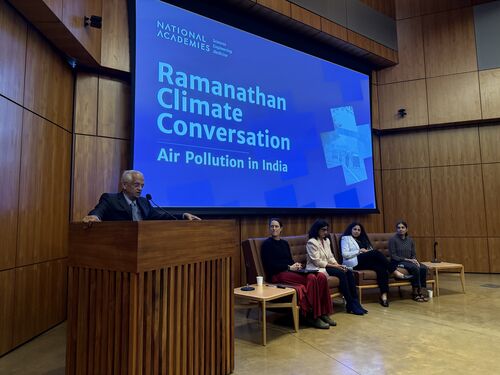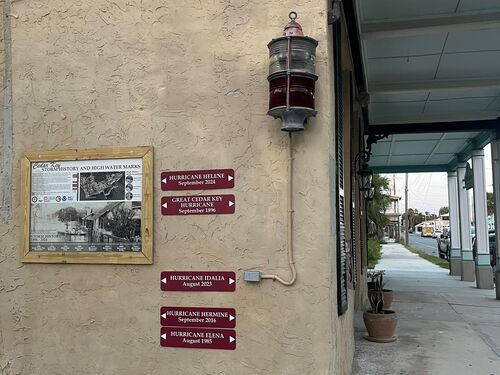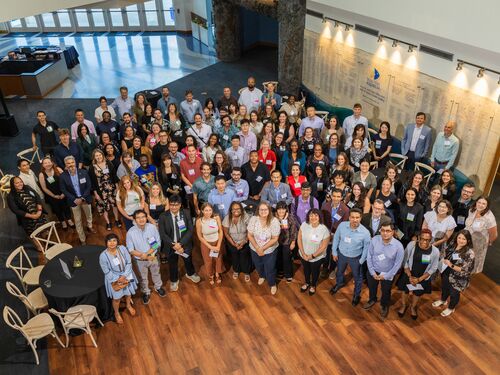Gulf Research Program Awards $3.4 Million To Reduce the Burden of Disaster-Related Mental Health Consequences
Program News
By Pete Nelson
Last update October 14, 2022
WASHINGTON — The Gulf Research Program (GRP) of the National Academies of Sciences, Engineering, and Medicine today announced awards totaling $3.4 million to support four projects that reduce the burden of disaster-related mental health consequences with a focus on acute disasters.
According to a 2015 National Academies report, Healthy, Resilient, and Sustainable Communities After Disasters: Strategies, Opportunities, and Planning for Recovery, disasters are inherently devastating to communities, “often resulting in significant and long-lasting individual- and population-level effects on physical, mental, and social well-being in communities where health in many cases already is suboptimal.”
The Gulf of Mexico is a region that has faced numerous crises in the last 15 years, including acute disasters such as Hurricane Katrina in 2005, the Deepwater Horizon oil spill in 2010, Hurricane Harvey in 2017, and a record-breaking five-hurricane season in 2020. These disasters have resulted in a range of documented mental health outcomes, including psychological distress, substance use, anxiety, post-traumatic stress disorder (PTSD), depression, and suicidal ideation.
“Many communities in the Gulf of Mexico region experience repeated and compounding disasters that lead to adverse mental health outcomes,” said Dan Burger, senior program manager for the GRP’s Gulf Health and Resilience Board. “These grants are focused on filling critical knowledge gaps through culturally appropriate interventions that are designed to reduce disaster-related mental health burdens within vulnerable communities. The funded projects all reflect our commitment to advancing health and resilience at the local level through science and partnerships.”
The awarded projects are (listed in alphabetical order):
M-O-M-S on the Bayou: Implementation of an intervention for mental health in pregnancy
Project Director (PD): Emily Harville
PD Organization: Tulane University
Project Location: Bayou Region and River Parishes in southern Louisiana
Award Amount: $999,306
Project Team
- Karen Weis, Kansas State University
- Gloria Giarratano, Louisiana State University Health Sciences Center
- Michelle Patterson, Nicholls State University
- Mary Schultheis, Crescent City Family Services
- Katherine Mill, Tulane University
Project Summary:
Experiencing natural disaster during pregnancy is associated with long-term mental and physical effects on mother and child, but few interventions address this population or circumstance. The Mentors Offering Maternal Support (M-O-M-S) intervention focuses on the mother’s mental health, relationships, and cognitions around pregnancy, incorporating “mentorship” by nonclinical but trained facilitators, who lead sessions over the course of pregnancy. This intervention reduced pregnancy-specific anxiety and improved birth outcomes among military women dealing with deployment. Through interviews with key stakeholders in a region that has been hit with multiple disasters, we will adapt the M-O-M-S intervention to determine how it can best be deployed post-disaster. We will use the EPIS (Exploration, Preparation, Implementation, Sustainment) framework to implement the intervention to achieve the following aims: 1) Conduct formative community-informed needs assessment interviews with pregnant and postpartum women, prenatal care providers, disaster planners, and other service providers to assess barriers to and facilitators of implementing this program; and determine promising strategies for implementing the program in a disaster-affected area. 2) Assess the outcomes (acceptability, adaptation, adoption, feasibility, fidelity, and sustainability) of implementing the M-O-M-S intervention in this region and set of circumstances. 3) Assess the effectiveness of the M-O-M-S intervention for improving mental health. This project will help develop an evidence-based toolkit for mitigating effects of disaster. Without such interventions, effects of disaster will be worse than they need to be, and extend to the next generation.
Nature-based therapy: A socioecological and RE-AIM approach to treating disaster-related PTSD in flood-vulnerable communities
Project Director (PD): Dongying Li
PD Organization: Texas A&M University
Project Location: Houston, Texas
Award Amount: $448,879
Project Team
- Vani Mathur, Department of Psychology
- Galen Newman, Department of Landscape Architecture and Urban Planning
- Jason Gordon, School of Forestry and Natural Resources
- Deidra Davis, Department of Landscape Architecture and Urban Planning
Project Summary:
More than a third of individuals exposed to major disasters may develop post-traumatic stress disorder. Although post-disaster PTSD prevalence generally decreases after a year, studies have reported delayed-onset PTSD and psychological distress in disadvantaged groups at a five-year follow-up. Nature-based therapy (NBT) has potential as a low-cost, multilevel intervention to reduce individual PTSD symptoms and enhance community resilience; however, existing evidence mostly involves veterans. The efficacy and longer-term maintenance of NBT in reducing symptoms in hurricane-affected communities remain unelucidated, especially for Hispanic populations in historically redlined neighborhoods, which have distinct cultural traits and face disproportionate environmental and social stressors that impact their relations with natural space. This project aims to: 1) develop and assess an NBT program in the context of ethnic minority and flood-vulnerable neighborhoods using a RE-AIM (reach, effectiveness, adoption, implementation, and maintenance) framework, and 2) determine the efficacy of NBT at reducing PTSD and mental distress symptoms. To achieve these aims, we will use a mixed methods design to develop a locally appropriate NBT intervention using community-engaged research (Phase I), carry out a randomized controlled trial (Phase II), and assess the implementation and sustainability using the RE-AIM framework (Phase III). Being grounded in a socioecological perspective at the human-place nexus, the results will advance science regarding NBT efficacy in mitigating PTSD and inform an integrative community resilience framework to combat climate-related natural disasters. The intervention is relatively low-cost and ecologically acceptable, and can be adopted in similar under-resourced ethnic minority communities.
Reducing Disparities in Disaster-Related Mental Health Burden: Adapting a multilevel intervention to build community-based response
Project Director (PD): Jennifer Scott
PD Organization: Louisiana State University
Project Location: East Baton Rouge Parish, Louisiana
Award Amount: $999,992
Project Team
- Tara Powell, University of Illinois, Urbana-Champaign
- Leonard (Khalid) Hudson, Together Baton Rouge
Project Summary:
The Community-Based Participatory Research study will follow a multiphase, mixed-methods design to adapt, deliver, and assess the efficacy of the adapted Resilience and Coping for the Healthcare Community (RCHC) intervention model. We will partner with a broad-based community organization, Together Baton Rouge, to adapt the intervention model to fit the African American community context of East Baton Rouge Parish. The objectives of the multilevel intervention model are twofold: (1) reduce psychological distress and amplify protective factors among individuals and communities at risk of experiencing disasters; and (2) build individual and community psychological support response capacity. The intervention will be delivered at community institutions (e.g., churches) to their institutional members. We will conduct a stepped wedge cluster randomized controlled trial to examine the impact of the adapted intervention. Measures of mental health, coping, social support, and community resilience will be assessed at four timepoints. We will conduct interviews and group reflections with community facilitators and participants to gain insight into their experiences with the intervention. The study will inform the development of an intervention and delivery model potentially deliverable through other broad-based coalitions of organizations.
Testing the Feasibility of an Online Stress Management Intervention for Disaster-Exposed Young Adult Vietnamese Americans
Project Director (PD): David Abramson
PD Organization: New York University
Project Location: New Orleans, Louisiana, and Houston, Texas
Award Amount: $999,661
Project Team
- Lawrence Yang, New York University
- Emily Goldmann, New York University
- PhuongThao Le, New York University
- Mai Do, Tulane University
- Mark VanLandingham, Tulane University
Project Summary:
Vietnamese Americans living along the Gulf Coast have experienced many collective traumas: the cultural trauma of displacement from their homes at the end of the Vietnam War in 1975; the destruction of 2005’s Hurricane Katrina, the costliest natural disaster in U.S. history; the economic and ecological devastation of the Deepwater Horizon oil spill in 2010; and most recently the health and economic disruptions of the coronavirus pandemic. Alongside these acute collective stressors, many in the Vietnamese communities have also struggled with the pressures of acculturation, particularly among young adult second-generation immigrant Vietnamese Americans who have trouble communicating with non-English speaking parents and grandparents. Although these Vietnamese communities have exhibited individual, familial, and community resilience in the face of the many disasters and stressors, there are reports of rising rates of mental health distress and disability among disaster-exposed individuals, even while the pursuit of mental health treatment remains highly stigmatized. This proposed project will test the fit and feasibility of adapting and employing an online version of an evidence-based mental health intervention, Self Help Plus, among young adult Vietnamese Americans in New Orleans and Houston to address in a culturally tailored fashion the specific mental health needs of this community. In collaboration with the Tulane University Center for Studies of Displaced Populations, the NYU Center for Public Health Disaster Science and NYU’s Global Mental Health and Stigma Program will partner with two community-based organizations, VAYLA and BPSOS, to recruit and conduct a culturally adapted, evidence-based stress management intervention involving online group sessions and guided audio instruction.
The National Academies’ Gulf Research Program is an independent, science-based program founded in 2013 as part of legal settlements with the companies involved in the 2010 Deepwater Horizon disaster. It seeks to enhance offshore energy system safety and protect human health and the environment by catalyzing advances in science, practice, and capacity to generate long-term benefits for the Gulf of Mexico region and the nation. The program has $500 million for use over 30 years to fund grants, fellowships, and other activities in the areas of research and development, education and training, and monitoring and synthesis.
The National Academies of Sciences, Engineering, and Medicine are private, nonprofit institutions that provide independent, objective analysis and advice to the nation to solve complex problems and inform public policy decisions related to science, technology, and medicine. They operate under an 1863 congressional charter to the National Academy of Sciences, signed by President Lincoln.
Contact:
Pete Nelson, Director of Communications
Gulf Research Program
PNelson@nas.edu
More like this
Discover
Events
Right Now & Next Up
Stay in the loop with can’t-miss sessions, live events, and activities happening over the next two days.
NAS Building Guided Tours Available!
Participate in a one-hour guided tour of the historic National Academy of Sciences building, highlighting its distinctive architecture, renowned artwork, and the intersection of art, science, and culture.



